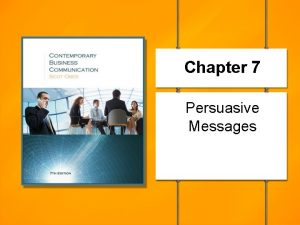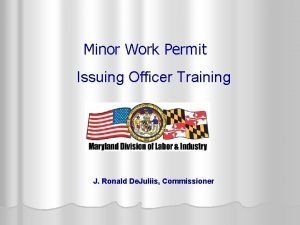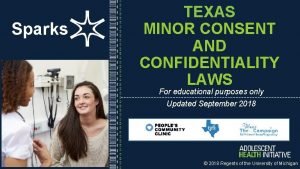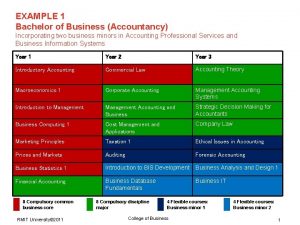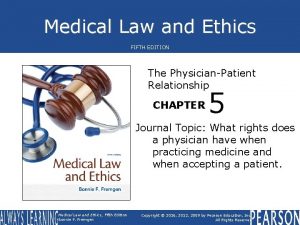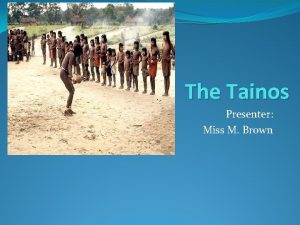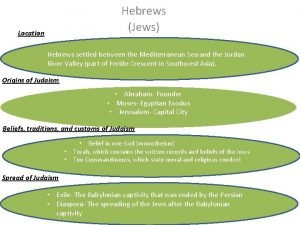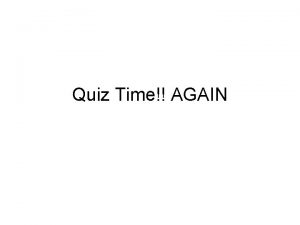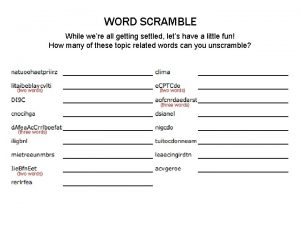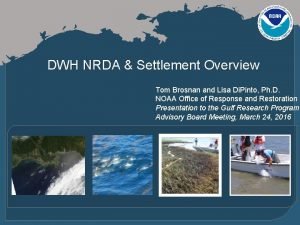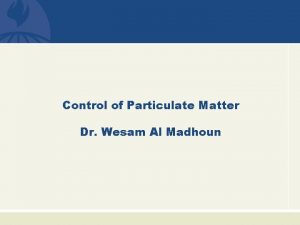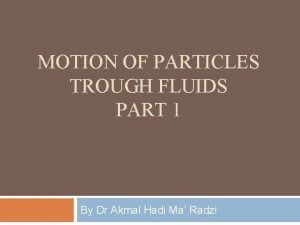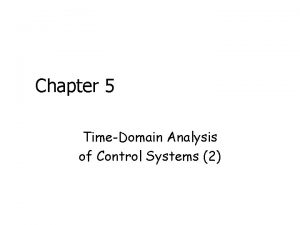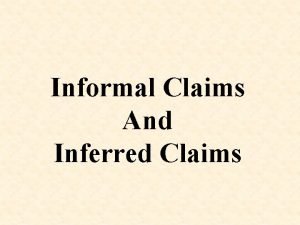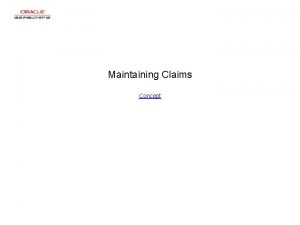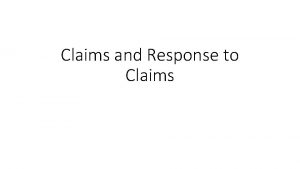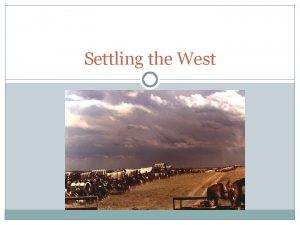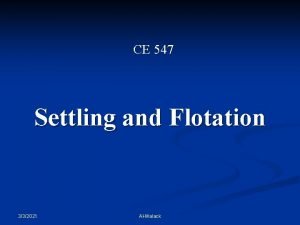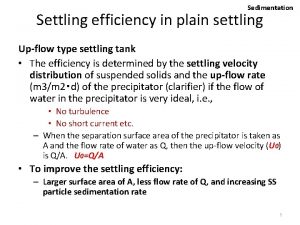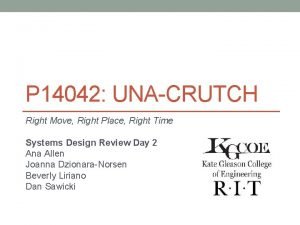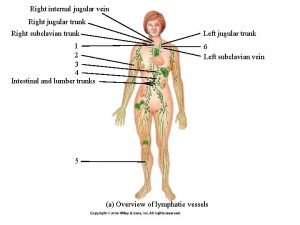We Are Settled Right Settling Claims of Minors






![Protection of Minors by the Courts “[A] parent has no legal right, by virtue Protection of Minors by the Courts “[A] parent has no legal right, by virtue](https://slidetodoc.com/presentation_image_h2/4bdf3497a9a519ac12ec146fc4679b24/image-7.jpg)




















- Slides: 27

We Are Settled, Right? Settling Claims of Minors, Disabled Persons, and the Deceased April 17, 2020 Donald Patrick Eckler Pretzel & Stouffer, Chartered John P. Heil, Jr. Heyl, Royster, Voelker & Allen, P. C.

Proper Settlement is Defense Counsel’s Ensure Here’s the story, titled “Whose Job Is It, Anyway? ” This is a story about four people named Everybody, Somebody, Anybody and Nobody. There was an important job to be done and Everybody was sure that Somebody would do it. Anybody could have done it, but Nobody did it. Somebody got angry about that, because it was Everybody’s job. Everybody thought Anybody could do it, but Nobody realized that Everybody wouldn’t do it. It ended up that Everybody blamed Somebody when Nobody did what Anybody could have. While it is not defense counsel’s job, making sure it is done properly likely is. Relying on plaintiff’s counsel may not be sufficient. Consulting with probate counsel may be wise in a particular case.

Proper Settlement is Defense Counsel’s Ensure As shown in Estate of Powell v. Wunsch, 2014 IL 115997, there are perils to counsel in not properly settling a case. Not only does plaintiff’s counsel have exposure, but so too might defendants and defense counsel if all of the claims are not released, if the releases are not proper, or both. As most cases resolve short of trial, including by settlement, making sure you are actually settled is critical. This applies in a tort case in which you represent a defendant, an interpleader where you represent an insurer or a claimant, cases settled pre-suit, and perhaps even uninsured and underinsured motorist claims.

Prompt Settlement Statute 735 ILCS 5/2 -2301(d) provides that the thirty days does not begin to run to tender the settlement draft until all of the documents necessary are tendered. Section (b) provides: “In a personal injury, property damage, wrongful death, or tort action involving a claim for money damages in which the law requires court approval of a settlement, the plaintiff shall tender to the defendant a copy of the court order approving the settlement. ” The focus on Section 2 -2301 is often on liens, but in a particular case the appropriate approval is necessary. Defense counsel should make sure the proper orders are obtained.

Protection of Minors by the Courts “Under Illinois law, a minor is a ward of the court when he is involved in litigation, and the court has a duty and broad discretion to protect the minor's interests. ” Smith v. Smith, 358 Ill. App. 3 d 790, 792 (4 th Dist. 2005) quoting Wreglesworth v. Arctco, Inc, 316 Ill. App. 3 d 1023, 1026 (1 st Dist. 2000). The court’s duty is reflected in Section 19 -8 of the Probate Act, requiring the court to approve or reject a claim of the ward.

Protection of Minors by the Courts 755 ILCS 5/19 -8 provides: “By leave of court without notice or upon such notice as the court directs, a representative may compound or compromise any claim or any interest of the ward or the decedent in any personal estate or exchange any claim or any interest in personal estate for other claims or personal estate upon such terms as the court directs. ”
![Protection of Minors by the Courts A parent has no legal right by virtue Protection of Minors by the Courts “[A] parent has no legal right, by virtue](https://slidetodoc.com/presentation_image_h2/4bdf3497a9a519ac12ec146fc4679b24/image-7.jpg)
Protection of Minors by the Courts “[A] parent has no legal right, by virtue of the parental relationship, to settle a minor's cause of action, and court review and approval of a settlement reached by a parent also is mandatory. ” Smith, 358 Ill. App. 3 d at 793 quoting Ott v. Little Co. of Mary Hospital, 273 Ill. App. 3 d 563, 571 (1 st Dist. 1995). “[A]ny settlement of a minor's claim is unenforceable unless and until there has been approval by the probate court. ” Villalobos v. Cicero Sch. Dist. 99, 362 Ill. App. 3 d 704, 712 (1 st Dist. 2005) quoting Wreglesworth v. Arctco, Inc, 316 Ill. App. 3 d 1023, 1028 (1 st Dist. 2000).

Protection of Minors by the Courts While the Probate Act allows an affidavit to be filed under Section 755 ILCS 5/25 -2 that does not indicate approval of the settlement by the court and is not binding on the minor. Smith, 358 Ill. App. 3 d at 793 -794. 755 ILCS 5/25 -2 provides: Upon receiving an affidavit that the personal estate of a ward does not exceed $10, 000 in value, that no representative has been appointed for his estate and that the affiant is a parent or a person standing in loco parentis to the minor or is the spouse of the ward or, if there is no spouse of the ward, that affiant is a relative having the responsibility of the support of the person under legal disability or ward, any person or corporation indebted to or holding personal estate of the ward may pay the amount of the indebtedness or deliver the personal estate to the affiant. … Upon the payment, delivery, transfer or issuance pursuant to the affidavit, the person or corporation is released to the same extent as if the payment, delivery, transfer or issuance had been made to the legally qualified representative of the ward and is not required to see to the application or disposition of the property.

Protection of Minors by the Courts The filing of the affidavit pursuant to Section 25 -2 protects the insurer as the indebted party, but not the insured. In order to protect the insured, the defendant should make sure that the insured is protected as well.

Protection of Minors by the Courts Cook County Local Rule 12. 15 governs how circumstances where a case is not in suit are handled for the approval of a settlement with a minor. In relevant part, the Rule states: (b) If no proceeding is pending before another Division or another court for recovery on a cause of action for personal injury or for wrongful death, the role of the Probate Division shall be as provided in this subparagraph. (i) To settle a cause of action for personal injury to a minor or a disabled person, the guardian of the estate of the ward shall file in the court a petition for approval of the settlement of the cause of action. Upon approving the settlement the judge shall determine the expenses, including the attorney's compensation, to be deducted from the proceeds.

Protection of Minors by the Courts Cook County Local Rule 6. 4, which governs cases which are in suit, provides: The procedure to be followed in cases involving claims of minors or disabled persons pending in divisions other than the Probate Division shall be as follows: (a) The judge hearing the case, upon the approval of a settlement as fair and reasonable or upon the entry of a judgment, shall adjudicate liens, determine the expenses, including attorneys' compensation, to be deducted from the settlement or judgment and shall determine the net amount distributable to the minor or disabled person. (b) Except as otherwise limited by rule or statute, attorneys’ compensation shall not exceed onethird of the recovery if the case is disposed of in the trial court by settlement or trial. If an appeal is perfected, the compensation to be paid to the attorney shall not in any event exceed one half of the recovery.

Protection of Minors by the Courts Cook County Local Rule 6. 4, which governs cases which are in suit, provides: (c) The order approving the settlement or the order entering the judgment shall provide that the amount distributable to the minor or disabled person shall be paid only to a representative of the minor or disabled person appointed by the Probate Division and upon presentation of an order entered in the Probate Division approving the bond or other security required in connection therewith, except that if the amount distributable to the minor or disabled person does not exceed $10, 000, and no representative has been appointed in the Probate Division, the judge hearing the case may by order provide for the distribution to a parent or person standing in loco parentis to the minor or to the spouse or relative having the responsibility of the support of the disabled person in accordance with the provisions of 755 ILCS 5/25 -2. (d) The distributable amount received by a representative of a minor or disabled person pursuant to the provisions of this section shall be accounted for and administered in the Probate Division as in any other estate of a minor or disabled person.

Protection of Heirs in Wrongful Death Actions Deceased persons, like minors who are alive and well, are afforded protections under Illinois law that directly impact settlements. Depending on the circumstances, these protections can greatly complicate—or invalidate—a settlement.

Protection of Heirs in Wrongful Death Actions The Illinois Wrongful Death Act, 740 ILCS 180, provides part (but not all) of the framework for settling a civil action for negligence filed on behalf of a deceased individual. A wrongful death claim “shall be brought by and in the names of the personal representatives of [the] deceased person. ” A “personal representative” can be: A special administrator appointed by the trial court pursuant to 740 ILCS 180/2. 1; • • when the lawsuit is the only asset of the estate and no probate estate was opened; through a motion by anyone entitled to recover under the Act and notice to all heirs - or A personal representative appointed by the probate court. • • pursuant to letters testamentary or letters of administration; forecloses the appointment of a special administrator under the Act Problem: on certain occasions, both existed simultaneously.

Protection of Heirs in Wrongful Death Actions The decedent’s personal representative, as a Wrongful Death Act plaintiff, is a nominal party, acting on behalf of others. need not be next of kin fiduciary duty to the wrongful death beneficiaries Who are the wrongful death beneficiaries? Per the Act, all recovered proceeds “shall be for the exclusive benefit of the [decedent’s] surviving spouse and [the decedent’s] next of kin. ” “Next of kin”: blood relatives of the decedent alive at the time of the decedent’s death who would take personal property if the decedent died intestate (determined by the laws of intestacy) must be identified and provided notice of the action and any potential settlement

Protection of Heirs in Wrongful Death Actions Notice to next of kin is of paramount importance. Alerts potential beneficiaries of the wrongful death claim and appointment of the representative, and allows for objections. Under the Probate Act, notice is satisfied by: mailing petition appointing a representative and admitting a will to probate if no addresses, publication in newspapers for three weeks If not in probate, still must make good faith efforts through mailings, publication, etc.

Protection of Heirs in Wrongful Death Actions Defense counsel must remain vigilant. Although seemingly the responsibility of the representative plaintiff and plaintiff’s counsel, defense counsel must also protect their clients from further liability by making sure notice is handled in a comprehensive fashion. The failure to do so can kill a settlement (or worse).

Protection of Heirs in Wrongful Death Actions – Pruitt v. Jockisch, 228 Ill. App. 3 d 295 (4 th Dist. 1992) Facts: Estranged spouses Douglas and Penny Pruitt’s minor daughter drowned in a pool owned by the Jockisches. At the time of their daughter’s death, Douglas and Penny had been living separately for several years. Douglas lived in Green County; Penny in Cass County. Green County Circuit Court appointed Douglas as special administrator of his minor daughter’s estate. Douglas, on behalf of the estate, filed a wrongful death action against the Jockisches. The Jockisches moved to dismiss, and were able to show that: o Cass County had previously appointed Penny as special administrator of the daughter’s estate o Penny had settled with the Jockisches for $10, 000 and released all claims. Douglas argued he was never provided with notice of the appointment or potential settlement The trial court denied the Jockisches motion to dismiss, but granted a forum non conveniens motion and transferred the case to Cass County. On rehearing of the motion to dismiss, the Cass County court dismissed Douglas’ wrongful death suit. Douglas appealed.

Protection of Heirs in Wrongful Death Actions – Pruitt v. Jockisch Appellate Court’s Ruling: The Wrongful Death Act’s notice requirement was not met. The Jockisches argued, unsuccessfully, that defendants should be allowed to rely upon a circuit court’s order appointing a special administrator when entering into a settlement agreement. The court found that a “party dealing with a special administrator under section 3 of the Act can look to the records of the court making the appointment and find out if proof is shown that those entitled to notice by the terms of the petition were shown to be given that notice. ” Douglas was not provided with notice, so the settlement agreement and release was void as to him. The release remained in effect as to Penny (she could make no further recovery). Douglas was free to pursue his separate action against the Jockisches. In effect, Pruitt shifted the burden of ensuring proper notice to the defendants to a wrongful death action.

Protection of Disabled Persons in Wrongful Death Actions – Estate of Powell v. Wunsch The concerns expressed above for settlements involving minors and deceased persons are shared—and further complicated—in cases involving disabled persons. The Illinois Supreme Court’s ruling in Estate of Powell v. Wunsch, 2014 IL 115997, involving a disabled adult, clearly demonstrates the perils counsel can find themselves in when settling wrongful death claims. Facts: Perry Powell was adjudicated a disabled adult due to severe mental disabilities. His parents, Perry and Leona Smith, were appointed as co-guardians of his person (but not his estate). Perry Smith (Powell’s father) died following a surgical procedure, and Leona Powell, as special administrator for his estate, filed a wrongful death action. The action was the sole asset of Perry Smith’s estate.

Protection of Disabled Persons in Wrongful Death Actions – Estate of Powell v. Wunsch Facts (cont. ): Two settlements to the wrongful death case were ultimately reached: $15, 000 (to be distributed equally to Leona, Powell, and to Powell’s sister Emma). o Powell’s share to Leona on Powell’s behalf o Leona placed both her share and Powell’s share into a join account. She did notify the probate court of the settlement Approximately $118, 000 each to Leona and Powell (Emma did not participate). o The settlement order did not provide that the amount distributable to Powell was to be administered and distributed under probate court supervision. o No guardian for Powell’s estate was appointed. o Powell’s share was paid to Leona, who again place both shares in the joint account. o Counsel advised Leona that it was “too much trouble” to go through the probate court, as it would require her to request funds for him whenever they were needed.

Protection of Disabled Persons in Wrongful Death Actions – Estate of Powell v. Wunsch Facts (cont. ): Post-settlement issues: Emma became concerned with Powell’s care and visiting him at Leona’s home. She successfully petitioned the probate court to modify the guardianship arrangement, with her becoming guardian of Powell’s person. The Cook County Public Guardian was appointed as guardian of Powell’s estate Investigation revealed: o Leona did not use any of the money earmarked for Powell’s care for his benefit. o Only $26, 000 of the $236, 000 deposited in the joint account remained. o Leona never prepared an accounting of her expenditures from the account.

Protection of Disabled Persons in Wrongful Death Actions – Estate of Powell v. Wunsch Lower court action: The public guardian sued Leona and the attorneys that represented the Estate in the settlements of the wrongful death action (two sets). The claims against the lawyers alleged legal malpractice, alleging they breached a duty owed to Powell. The trial court dismissed the claims against the attorneys, finding that the complaint did not sufficiently allege a duty and proximate causation. The appellate court reversed in part, finding: o Leona’s attorneys owed Powell a duty as an intended beneficiary of the settlements o Proximate causation did not exist for the first settlement because probate court supervision is only required for settlements above $5, 000. o Proximate cause did exist for the larger settlement.

Protection of Disabled Persons in Wrongful Death Actions – Estate of Powell v. Wunsch Illinois Supreme Court’s ruling: Generally, an attorney is liable only to his or her client, and not to third parties. Exception: An attorney’s duty to the client may extend to non-clients who are intended third-party beneficiaries of the relationship between the attorney and client. Determined through the “intent to directly benefit” test: whether the primary purpose and intent of the attorney-client relationship itself was to benefit or influence a third party.

Protection of Disabled Persons in Wrongful Death Actions – Estate of Powell v. Wunsch Supreme Court’s ruling (cont. ): The Wrongful Death Act creates a cause of action for pecuniary losses suffered by the decedent’s spouse and next of kin. Any amount recovered in a wrongful death action is for the exclusive benefit of the spouse and next of kin—not for the decedent’s estate. The beneficiaries named in a wrongful death action are intended beneficiaries, so the plaintiff’s attorney’s duty to his or her client (i. e. , the estate) extends to the beneficiaries.

Protection of Disabled Persons in Wrongful Death Actions – Estate of Powell v. Wunsch Supreme Court’s ruling (cont. ): The complaint in Powell adequately alleged that the Estate’s attorneys owed a legal duty to Powell at the distribution of funds phase of the action and breached that duty. As for proximate causation, the court ruled: o Unable to demonstrate proximate cause for the $5, 000 settlement, but o It was sufficiently pleaded for the $118, 000 settlement because, if the Wrongful Death Act had been properly followed, a guardian would have been appointed and distribution would have been subject to the probate court’s supervision.

Lessons from Pruitt and Powell Defense counsel should take extra care in entering into a wrongful death settlement. The NOTICE requirement to all potential next of kin must be strictly followed, or a forgotten heir may retain the ability to bring a separate action against your client after the original—assumed final— settlement. o Review probate court filings for information about beneficiaries, assets of the state, and payments received by the estate from other sources. o Make sure releases include language affirming that the plaintiff provided notice to all potential beneficiaries. o Don’t enter into a settlement if you are unsure about notice to all beneficiaries! Complicated, perhaps time-consuming work in appointing a guardian and invoking the probate court should not be avoided for convenience sake. If probate court supervision of the distribution of settlement proceeds is appropriate under the statute, it may fall on defense counsel to withhold an agreement before those actions are taken.
 Insidan region jh
Insidan region jh Right time right place right quantity right quality
Right time right place right quantity right quality Right product right place right time right price
Right product right place right time right price The right man on the right place at the right time
The right man on the right place at the right time Unlike routine claims, persuasive claims:
Unlike routine claims, persuasive claims: Maryland work permit for minors
Maryland work permit for minors Emancipated minors definition
Emancipated minors definition Wku minors
Wku minors Texas confidentiality laws for minors
Texas confidentiality laws for minors Bachelor of business (accountancy) rmit
Bachelor of business (accountancy) rmit Blackboard mst
Blackboard mst Emancipated minors definition
Emancipated minors definition Tainos appearance
Tainos appearance Hebrews location
Hebrews location Impossiblee quiz
Impossiblee quiz Settlement patterns
Settlement patterns Settled word scramble
Settled word scramble Settled dwh
Settled dwh Settling the west 1865-1890
Settling the west 1865-1890 Control of particulate matter
Control of particulate matter Gravitational settling chamber
Gravitational settling chamber Differential settling method
Differential settling method Define terminal settling velocity
Define terminal settling velocity Settling on the great plains section 2
Settling on the great plains section 2 Clarifier design example
Clarifier design example Where can we find rotating arm sprays in sewage treatment
Where can we find rotating arm sprays in sewage treatment Late charges in front office
Late charges in front office Dominant poles
Dominant poles




